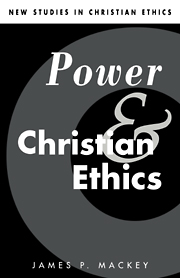Book contents
4 - The Christian experience of power
Published online by Cambridge University Press: 05 November 2011
Summary
Readers and writers of a book like this would expect a changeover from a broadly philosophical to a theological point of view. And such an expectation need not be disappointed, provided that neither reader nor writer is trapped in the peculiarly modern prejudice which sees theology and philosophy as quite distinct, if not in fact opposed disciplines. For those who understand that theology refers to the ‘logos’ of ‘theos’, and that the origins of Western philosophy are found precisely in a growing preference for ‘logos’ over ‘mythos’, can well see that theology is a constitutive part of philosophy. Even the philosophical conclusion that there is no god is a piece of theology, if only because it requires as much effort to define the term ‘god’ as do any of the“ philosophies that profess to deal with such an entity. Gods have been on the philosophical agenda from the very outset, and even their removal from the agenda can scarcely succeed without critical consideration of the functions they fulfilled in the human prospect, and the reasons as to how these functions can now be fulfilled without them, or the reasons as to why they must be thought to remain unfulfilled. So then, the expected changeover from a broadly philosophical to a theological point of view must really take the form of a move to the more intentionally theological reaches of philosophy.
- Type
- Chapter
- Information
- Power and Christian Ethics , pp. 151 - 180Publisher: Cambridge University PressPrint publication year: 1994

